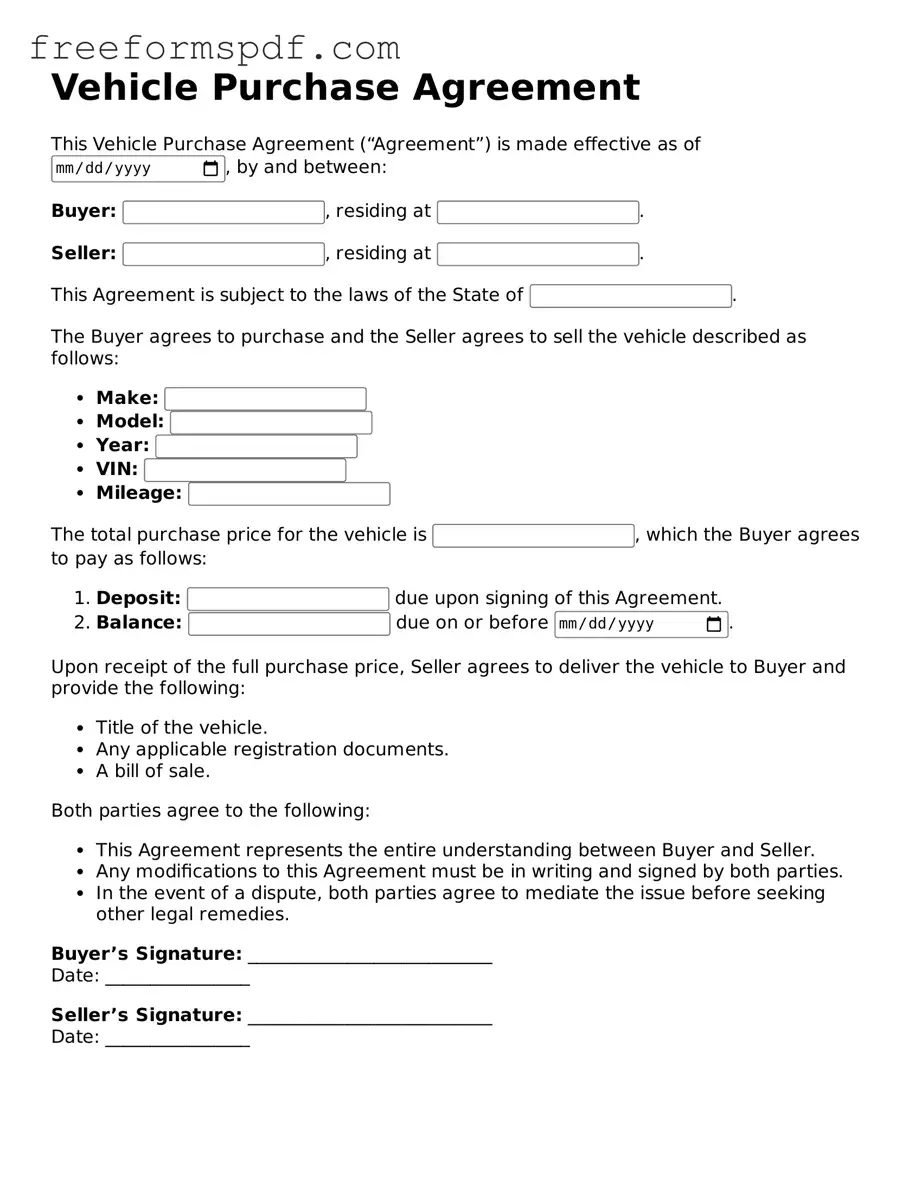Vehicle Purchase Agreement Document
Vehicle Purchase Agreement - Customized for Each State
Common mistakes
-
Incorrect Vehicle Information: One common mistake is failing to accurately fill in the vehicle's make, model, year, and VIN (Vehicle Identification Number). This information is crucial for identifying the vehicle being purchased.
-
Omitting Buyer and Seller Details: Buyers and sellers sometimes forget to include their full names, addresses, and contact information. This omission can lead to confusion or disputes later on.
-
Ignoring Financing Terms: When financing is involved, it’s important to clearly state the loan amount, interest rate, and payment schedule. Neglecting these details can create misunderstandings about the financial obligations.
-
Not Specifying Additional Costs: Buyers may overlook additional costs such as taxes, registration fees, and dealer fees. These costs should be itemized to give a complete picture of the total purchase price.
-
Failing to Review the Agreement: Some individuals rush through the process and do not take the time to read the entire agreement. This can lead to missing critical clauses or terms that could affect the purchase.
-
Not Keeping a Copy: After signing, it’s essential to keep a copy of the Vehicle Purchase Agreement. Failing to do so can result in difficulties if any issues arise in the future.
Learn More on This Form
-
What is a Vehicle Purchase Agreement?
A Vehicle Purchase Agreement is a legal document that outlines the terms and conditions of the sale of a vehicle between a buyer and a seller. This agreement typically includes details such as the purchase price, vehicle identification number (VIN), and any warranties or guarantees provided by the seller. It serves as a record of the transaction and protects both parties by clearly stating their rights and responsibilities.
-
Why do I need a Vehicle Purchase Agreement?
Having a Vehicle Purchase Agreement is essential for several reasons. Firstly, it provides proof of the transaction, which can be important for registration and title transfer. Secondly, it helps to clarify the terms of the sale, reducing the likelihood of misunderstandings or disputes later on. Lastly, it can serve as a legal safeguard in case any issues arise post-sale, such as undisclosed defects or disagreements over payment.
-
What should be included in a Vehicle Purchase Agreement?
A comprehensive Vehicle Purchase Agreement should include the following key elements:
- The names and contact information of both the buyer and seller.
- The vehicle’s make, model, year, and VIN.
- The agreed-upon purchase price and payment method.
- Any warranties or guarantees, if applicable.
- Disclosure of any known defects or issues with the vehicle.
- The date of the transaction and any additional terms or conditions.
Including these details ensures clarity and can prevent potential disputes in the future.
-
Can I modify a Vehicle Purchase Agreement?
Yes, you can modify a Vehicle Purchase Agreement, but it is important to do so carefully. Any changes should be documented in writing and signed by both parties to ensure that they are legally binding. This might include adjustments to the purchase price, payment terms, or any other conditions. Verbal agreements can lead to misunderstandings, so it's best to keep everything in writing.
-
What happens if the Vehicle Purchase Agreement is not followed?
If either party fails to adhere to the terms of the Vehicle Purchase Agreement, it may lead to legal consequences. The aggrieved party can seek remedies, which may include demanding performance of the contract, seeking damages, or even pursuing legal action. To avoid such situations, both parties should ensure they fully understand the agreement before signing and maintain open communication throughout the process.
Misconceptions
When it comes to purchasing a vehicle, many people encounter the Vehicle Purchase Agreement form. Unfortunately, several misconceptions can lead to confusion or even financial trouble. Here are six common misunderstandings about this important document:
- It's Just a Formality: Many buyers think the Vehicle Purchase Agreement is merely a formality. In reality, this document is a legally binding contract that outlines the terms of the sale. Ignoring its importance can lead to disputes later.
- All Agreements Are the Same: Some believe that all Vehicle Purchase Agreements are identical. However, each agreement can differ significantly based on the dealership, state laws, and specific terms negotiated. Always read the fine print.
- Verbal Agreements Are Sufficient: A common misconception is that a verbal agreement with a dealer is enough. In truth, without a written contract, it can be challenging to enforce any promises made. The written agreement serves as a crucial record.
- Signing Means You Can't Back Out: Many think that once they sign the agreement, they are stuck. While it's true that signing indicates your acceptance, certain conditions, like financing issues or undisclosed defects, may allow you to back out.
- Only the Price Matters: Buyers often focus solely on the purchase price. However, the agreement may include additional fees, warranties, and financing terms that can affect the total cost. Understanding all components is vital.
- It's Only for New Cars: Some people assume that the Vehicle Purchase Agreement is only necessary for new vehicles. In reality, it applies to both new and used cars. Whether buying from a dealer or a private seller, a written agreement is essential.
Understanding these misconceptions can empower buyers to navigate the vehicle purchasing process more effectively. A well-informed buyer is better equipped to make decisions that protect their interests.
Popular Forms:
Standard Nda Template - This document can be essential in mergers and acquisitions to maintain confidentiality.
Home Purchase Agreement Template - Critical for establishing how communications regarding the sale will be handled.
The application process can be complex, but resources like the NY Templates can help streamline the experience, guiding applicants through requirements and ensuring that they submit all necessary information for their NYC Housing Application Form effectively.
Employment Verification Form - It provides historical employment context for individual development plans.
